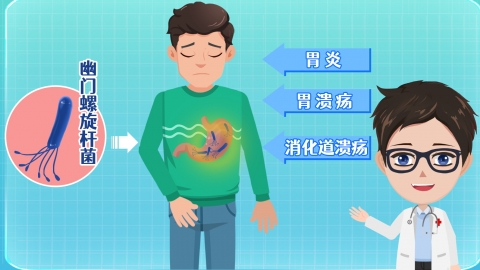How is atrophic gastritis treated?
Normally, atrophic gastritis may be caused by factors such as unhealthy lifestyle habits, long-term use of nonsteroidal anti-inflammatory drugs (NSAIDs), vitamin B12 deficiency, Helicobacter pylori infection, or autoimmune gastritis. It can be treated through reasonable diet, timely discontinuation of medications, nutritional supplementation, and traditional Chinese medicine treatments. Patients are advised to visit a hospital promptly and follow medical guidance for treatment. The detailed analysis is as follows:

1. Unhealthy Lifestyle Habits
Long-term irregular eating habits, overeating, consuming spicy, greasy, or cold foods, and excessive alcohol consumption or smoking can all damage the gastric mucosa and lead to atrophic gastritis. Patients are advised to avoid excessively cold, hot, spicy, or greasy foods and reduce intake of stimulants such as coffee and alcohol.
2. Long-Term Use of Nonsteroidal Anti-Inflammatory Drugs (NSAIDs)
Nonsteroidal anti-inflammatory drugs such as aspirin tablets and indomethacin tablets can inhibit the synthesis of prostaglandins in the gastric mucosa when used long-term, weakening the protective barrier of the gastric mucosa and making it more susceptible to damage, which can lead to atrophic gastritis. Patients are advised to discontinue or reduce NSAID use promptly.
3. Vitamin B12 Deficiency
Vitamin B12 is a nutrient essential for maintaining nervous system and red blood cell health and also plays an important role in the repair and protection of the gastric mucosa. Long-term vegetarianism, gastrointestinal diseases, or intrinsic factor deficiency caused by autoimmune gastritis can all affect vitamin B12 absorption, potentially leading to gastric mucosal atrophy. Supplementing vitamin B12 as directed by a physician—for example, with medications such as methylcobalamin for injection, vitamin B12 tablets, or vitamin B12 injections—and enhancing nutrition by increasing intake of foods rich in vitamin B12 are recommended.
4. Helicobacter pylori Infection
Helicobacter pylori is a bacterium that colonizes the gastric mucosa and produces toxins that damage the mucosal barrier, triggering inflammation and immune responses that lead to atrophy of the gastric mucosal epithelium and glands. Patients are advised to take medications such as omeprazole enteric-coated capsules, amoxicillin capsules, and cimetidine tablets under medical supervision to alleviate symptoms.
5. Autoimmune Gastritis
Autoimmune gastritis occurs when the immune system mistakenly attacks gastric mucosal cells. This attack leads to gastric mucosal atrophy, reduced gastric acid secretion, and intrinsic factor deficiency, which in turn affect the absorption and utilization of vitamin B12. Patients can seek treatment at hospitals with traditional Chinese medicine (TCM), which tailors treatment based on individual constitution and condition using syndrome differentiation. Herbs with functions such as strengthening the spleen and stomach, soothing the liver and relieving depression, and clearing heat and detoxifying—such as Codonopsis root (Dang Shen), Atractylodes (Bai Zhu), Bupleurum (Chai Hu), and Scutellaria (Huang Qin)—may be selected.
Patients should avoid excessive fatigue and mental stress and ensure adequate sleep. Engaging in moderate physical exercise to enhance physical fitness and improve immunity is recommended. Additionally, quitting smoking and limiting alcohol consumption can prevent irritation of the gastric mucosa.








